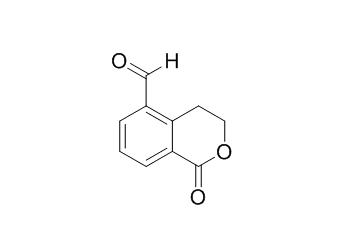Erythrocentaurin
Erythrocentaurin has antibacterial activity; it also exhibits a concentration-dependent α-amylase inhibition (IC(50) 1.67 ± 0.28 mg/mL).
Inquire / Order:
manager@chemfaces.com
Technical Inquiries:
service@chemfaces.com
Tel:
+86-27-84237783
Fax:
+86-27-84254680
Address:
1 Building, No. 83, CheCheng Rd., Wuhan Economic and Technological Development Zone, Wuhan, Hubei 430056, PRC
Providing storage is as stated on the product vial and the vial is kept tightly sealed, the product can be stored for up to
24 months(2-8C).
Wherever possible, you should prepare and use solutions on the same day. However, if you need to make up stock solutions in advance, we recommend that you store the solution as aliquots in tightly sealed vials at -20C. Generally, these will be useable for up to two weeks. Before use, and prior to opening the vial we recommend that you allow your product to equilibrate to room temperature for at least 1 hour.
Need more advice on solubility, usage and handling? Please email to: service@chemfaces.com
The packaging of the product may have turned upside down during transportation, resulting in the natural compounds adhering to the neck or cap of the vial. take the vial out of its packaging and gently shake to let the compounds fall to the bottom of the vial. for liquid products, centrifuge at 200-500 RPM to gather the liquid at the bottom of the vial. try to avoid loss or contamination during handling.
Korean Journal of Medicinal Crop Science2018, 26(5):382-390
Sci. Rep.2015, 14-23
Spectrochim Acta A2019, 210:372-380
J Traditional Thai Medical Res.2022, 8(1):pp1-14.
J Cell Mol Med.2021, 25(5):2645-2654.
Plants (Basel).2020, 9(11):1422.
Exp Ther Med.2019, 18(6):4388-4396
Antioxidants (Basel).2024, 13(12):1530.
NanoBioScience2024, v13:3:115.
Molecules.2023, 28(13):4907.
Related and Featured Products
Zhongguo Zhong Yao Za Zhi. 2015 Oct;40(20):4012-7.
Chemical constituents of Swertia patens.[Pubmed:
27062819]
Chemical constituents of Swertia patens. The whole plant of air-dried Swertia patens was extracted with 90% EtOH.
METHODS AND RESULTS:
The water extract was suspended in H₂O and extracted with petroleum ether, EtOAc and n-BuOH, successively. The compounds were isola- ted and purified by column chromatography from the EtOAc fraction, and identified based on spectral analyses (MS, ¹H-NMR, ¹³C- NMR). Eighteen compounds were isolated and elucidated as 3, 4-dihydro-1H,6H,8H-naptho [1,2-c:4,5-c', d'dipyrano-1, 8-dione (1), angelone (2), gentiogenal (3), erythricin (4), Erythrocentaurin (5), gentianine (6), swertiakoside B (7), swertiamarin (8), 2'-O-actylswertiamarin (9), amarogentin (10), 1, 3, 5-trihydroxyxanthone (11), 1, 3-dihydroxy-5-methoxyxanthone (12), 1-hydroxy- 2, 3, 5-trimethoxyxanthone (13), gentiocrucine (14), 3-hydroxyphenylketone (15), n-hexacosyl ester 4-hydroxy-trans-cinnamate (16), n-hexacosyl ester 4-hydroxy-cis-cinnamate (17), and cholest-4-en-3-one (18).
CONCLUSIONS:
Compounds 1-7, 9-18 were obtained from S. patens for the first time.
Nat Prod Res. 2006 Aug;20(10):896-901.
Phytochemical studies and antibacterial activity of Centaurium pulchellum Druce.[Pubmed:
16854716 ]
METHODS AND RESULTS:
Two isocoumarin derivatives, one new, erythricin (1) and a known Erythrocentaurin (2) were isolated from the whole plant of Centaurium pulchellum Druce. The 13C-NMR data of compound 2 are described. The structures of compounds 1, 2 were elucidated on the basis of spectral analysis including 2D-NMR experiments.
CONCLUSIONS:
Antibacterial and brine shrimp lethality assays are also described on the fractions of the plant extract.
J Sep Sci. 2015 Feb;38(4):592-8.
Rapid preparative isolation of erythrocentaurin from Enicostemma littorale by medium-pressure liquid chromatography, its estimation by high-pressure thin-layer chromatography, and its α-amylase inhibitory activity.[Pubmed:
25504557]
Erythrocentaurin is a relatively simple natural product present among the members of Gentianaceae. A preparative method for the isolation of Erythrocentaurin from the ethyl acetate fraction of Enicostemma littorale using medium-pressure liquid chromatography has been reported.
METHODS AND RESULTS:
The method consisted of a simple step gradient from 10 to 20% ethyl acetate in n-hexane. Using a 70 × 460 mm Si60 column, this method is capable of processing 20 g of material in <3 h (purity ≈ 97%). The recovery of Erythrocentaurin was 87.77%. Estimation of Erythrocentaurin in extracts and fractions based on high-pressure thin-layer chromatography was carried out on silica gel 60 F(254) plates with toluene/ethyl acetate/formic acid (80:18:2 v/v/v) as the mobile phase. The densitometric analysis was performed at 230 nm. A well-separated compact band of Erythrocentaurin appeared at R(f )0.54 ± 0.04. The analytical method showed good linearity in the concentration range of 200-1500 ng/band with a correlation coefficient of 0.99417.
CONCLUSIONS:
The limits of detection and quantification were found to be ≈60 and ≈180 ng/band, respectively. Erythrocentaurin exhibited a concentration-dependent α-amylase inhibition (IC(50) 1.67 ± 0.28 mg/mL). The outcome of the study should be considered for pharmacokinetic and biotransformation studies involving E. littorale.



